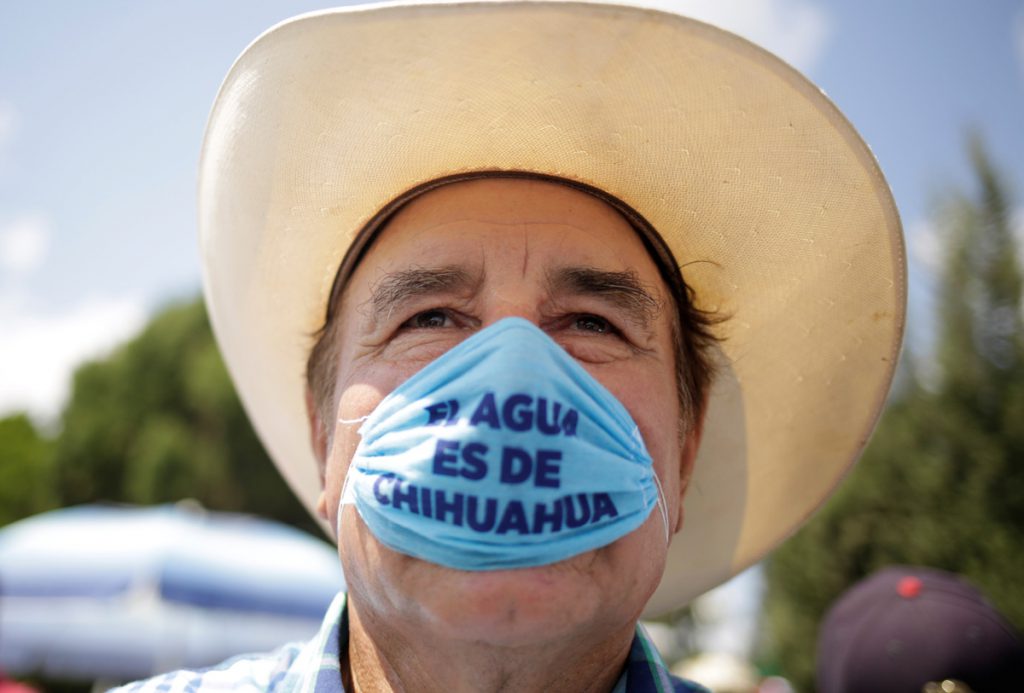Have you ever wondered what you would do without water? Water is indeed life. And without access to clean water, life’s hardships become further amplified. For many people in the US, water is a resource that they take for granted as it reliably flows through our fingers when we open a faucet in the kitchen or bathroom. Despite nearly 71% of the earth covered by water, large segments of people have little to no access to water. Recently, farmers in Chihuahua, Mexico, realized the precarious situation they found themselves in while enduring the drought at the same time that impending water payments were due because of a treaty with the United States that intended to promote water security in both countries. Mexican farmers faced with the harsh reality that they might not have water for their next harvest. The idea of this possibility prompted farmers and other citizens around the state to protest by blocking highways and showing up at dams. Tensions between the Mexican government and its constituents reached an all-time high when a protester was killed on September 8, 2020 by a Mexican national guard. So, how did the fight over water turn deadly?

To understand the severity of the issue, one must first go back to the ratification of the water treaty between the two countries. In 1944 The United States of America and Mexico signed the treaty “Utilization of Waters of the Colorado and Tijuana Rivers and of The Rio Grande”. This treaty was created to ensure the water security of both countries through the sending of water between each country.1 Every year the United States sends nearly 489 billion gallons of water from the Colorado River to their neighbor Mexico. Unfortunately, Chihuahua receives little to no water from this treaty. Most of the water sent by the United States is delivered to bordering states such as Nuevo Leon and Tamaulipas. Moreover, while they receive a small portion of the United States’ water payments, the state of Chihuahua sends more than half of the 114 billion gallons Mexico sends to the US each year. This has burdened the farmers of Chihuahua in recent years as they try to irrigate their own crops.2 Chihuahua is home to the biggest production of nuts and chilies in Mexico. In fact, Chihuahua produced 79,934 metric tons worth of pecans in 2015. This accounted for 65% of all pecan production in Mexico. when one considers that pecan trees require an estimated 34,000 gallons per year, it is easy to see why Chihuahua needs to retain as much water as they can in their dams for their farmers.3

Still, in 2020, Mexico fell behind in its payments to fulfill the requirements of the treaty of 1944. The country reportedly owes 345,600 acre-feet of water which is due by October 24th. This deficit accounts for 88% of what Mexico owes within the five-year quota. The President of Mexico, Andrés Manuel López Obrador, wants to make the payment and is relying heavily on Chihuahua to deliver most of that payment through its dams. As he sees it, it is in the best interest of the country to make the payment, since the United States sends more water to Mexico than Mexico sends back. The Mexican President also fears that President Trump will impose tariffs on Mexican products if Mexico fails to meet the requirements set forth by the treaty.4 However, Chihuahuan farmers know the effect the payment would have on their livelihoods. The transfer of the water Mexico owes to the United States would drastically decrease the water levels within Chihuahua, which would result in an exponential decrease in production as well. Fearing the future implications that the fulfillment of the treaty would have on their farms, Chihuahuan residents decided it was time to take a stand.5
Since the start of the year, Mexicans have been protesting the decision to pay for the treaty with Chihuahua’s limited water resources but the biggest protest came in September. In September, 2,000 farmers marched up to the dam name La Boquilla after hearing that the Mexican government had diverted increments of water to the United States instead of meeting the agreements it had with the farmers.6 Protesters were able to gain control of the dam when they overpowered law enforcement. As the news broke about the protest, the Mexican National Guard was deployed to La Boquilla Dam. Farmers first tried to dialogue and to preserve this resource, but they soon started feeling as though their needs were not being heard and escalating into violence. Confrontations between the two parties became more violent as farmers started setting fire on the dam’s infrastructure and damaging police vehicles in hopes that it would send a message to the government or gain more recognition from the media. Amidst all the commotion of the protest, a national guard shot and killed a woman protester and severely injured her significant other. Jessica Estrella Silva Zamarripa was the daughter of pecan farmers and the mother to three children. She was bravely fighting for her human right to water when she was killed. Her death shed a light on the issue of water distribution and has become a source of motivation from people all over Mexico.7

Meanwhile, President Andrès Manuel Lòpez Obrador attempted to downplay the protests and the severity of the issue. He went on record stating the protests had been staged by his political opposition.8 In a press conference, the President named 17 politicians who he says funded the fake protests. Andrès Manuel Lòpez Obrador has also attempted to gain more support from the Mexican population at large by stating he will request for the United Nations to complete a study to ensure that the United States is actually sending the amount of water that they say they are sending. Moreover, the President of Mexico assured his constituents that he will take matters into his own hands, saying he will personally appeal to the President of the United States to renegotiate the amount that Mexico owes or at least the terms by which that payment is made.9
With low rainfall and a large water debt payment looming, the Mexican government faced a dilemma. On one hand, the Mexican government wanted to keep good diplomatic ties with its neighboring country. Failure to make the payment could potentially result in sanctions on Mexican goods, which would affect more than the agricultural production of Chihuahua. On the other hand, if the payment of the water owed was made, President Andrès Manuel Lòpez Obrador could further alienate the people of Chihuahua. The transfer of the 345,600 acre-feet of water to the United States would leave Chihuahuans unable to water their crops for the following season. The President’s negligence regarding the issues provoked protests all over the State of Chihuahua against the violation of their human rights to preserving their water, their crops, and their lives.
Finally, on October 22, 2020, two days before the deadline for the water payment, Mexico and the United States reached an agreement that would account for the 345,600 acre-feet of water that was owed. The last-minute deal would hand over the rights of Mexico’s share of the water from the Amistad and Falcon dams to the United States. The terms of the agreement would reportedly spare Chihuahua with enough water for the next farming season. The deal would also implement “workgroups to analyze and develop water management tools to provide for increased reliability and predictability in Rio Grande water deliveries to users in the United States and Mexico”.10 While Mexico was able to fulfill the treaty requirements, it came at a huge cost to the country. Ultimately, the potential risk of water insecurity in the state of Chihuahua cost Mexico thousands of dollars worth of infrastructural damage plus the loss of life for one of its citizens, a young mother.
- “Utilization of Waters of the Colorado and Tijuana Rivers and of the Rio Grande” Accessed October 16, 2020, https://www.usbr.gov/lc/region/pao/pdfiles/mextrety.pdf. ↵
- Pamela Constable, “Mexican Farmers Occupy Dam to Stop Water Payments to the United States” Washington Post, https://www.washingtonpost.com/world/the_americas/us-mexico-water-dam-farm-protest/2020/09/13/dddb85e8-f3bb-11ea-999c-67ff7bf6a9d2_story.html, Accessed October 16, 2020. ↵
- Julio López-Díaz, “The Pecan Industry in Chihuahua Mexico: Challenges and Successes,” https://aces.nmsu.edu/ces/pecans/documents/9%20Lopez%20Diaz.pdf. ↵
- Mark Stevenson, “Mexico Struggles with U.S. Water Debt, Suggests U, N, Audit,” September 3, 2020, https://www.pbs.org/newshour/politics/mexico-struggles-with-u-s-water-debt-suggests-u-n-audit, Accessed October 16, 2020. ↵
- Pamela Constable, “Mexican Farmers Occupy Dam to Stop Water Payments to the United States” Washington Post, https://www.washingtonpost.com/world/the_americas/us-mexico-water-dam-farm-protest/2020/09/13/dddb85e8-f3bb-11ea-999c-67ff7bf6a9d2_story.html, Accessed October 16, 2020. ↵
- Mexico News Daily. “National Guard Backs off after Tear Gas Fails to Dislodge Chihuahua Farmers,” September 9, 2020. ↵
- Pamela Constable, “Mexican Farmers Occupy Dam to Stop Water Payments to the United States” Washington Post,https://www.washingtonpost.com/world/the_americas/us-mexico-water-dam-farm-protest/2020/09/13/dddb85e8-f3bb-11ea-999c-67ff7bf6a9d2_story.html, Accessed October 16, 2020. ↵
- Eoin, Wilson, “Mexico’s Water Crisis Heats up as Transfer to US Looms”, https://www.aljazeera.com/news/2020/10/8/mexico-water-crisis-heats-up-as-us-transfer-deadline-looms, Accessed November 2, 2020. ↵
- Patrick McDonnell, “Mexican Water Wars: Dam Seized, Troops Deployed, at Least One Killed in Protests about Sharing with US”, https://www.latimes.com/world-nation/story/2020-09-11/mexican-water-wars-dam-seized-troops-summoned-at-least-one-killed-in-dispute-about-water-sharing-with-u-s September 12, 2020. ↵
- Mark Stevenson, “Mexico Reaches Deal to Pay Water Debt to US”, https://abcnews.go.com/International/wireStory/mexico-reaches-deal-pay-water-debt-us-73768266, Accessed November 9, 2020. ↵



68 comments
Emilee Luera
This topic aroused my interest because I was unaware of the water treaty between the United States and Mexico. Agriculture has grown far larger than it used to be, and it now has substantially more power than it did earlier. Even common resources that are required are not delivered due to ideological conflicts.
Bijou Davant
This article puts into perespective natural resources. You never quite realize how valuable something is until either you lose it, or you see others not have access to it. You’re absolutely right, water is life. This issue was one that I was not aware of so its amazing to see people bring up these instances and bring awareness, in hopes to help.
Analyssa Garcia
Hi Andres, this is a great article. Unfortunately, it is not a surprise that the United States had a treaty “intending” to promote water security in both countries. Since the beginning, the U.S. has been exploiting other countries for its own benefit. I’m glad the people decided to protest, but I am sad for the life that was lost.
Juan Aguirre Ramirez
Hey Andres, you did a very interesting artile. It is important to highlight that protests gives voice to marginalized communities, as seen with the farmers demonstrations for access to water. Lack of water affects people, multiple communities and diffrent countries, yet some view it as a luxury when in reality is it a basic need for our lives. Though temporary relief was achieved, we need long term solutions to guarantee access to water for every person in the world
Daniela Garza Martinez
This is such an important topic to shed light to, I’m glad you were able to! It’s unfortunately not surprising that AMLO easily dismissed this like he has in the past. Late last year the state of Nuevo Leon had a similar issue where little to no water was available to residents throughout the state. We need to bring more awareness to these topics to better prepare/prevent.
Alejandra Pardo
Water indeed is life. I believe we tend to forget that water is a limited resource, if we don’t take care of this resource, we will be facing so many other problems in the future. Andres, you do such a will job informing others of the issue in Chihuahua, an issue I wasn’t aware of. It is saddening to hear that the issue of water is because of the government and not the lack of source. I hope they are able to bring the awareness needed to resolve the water issue.
Estefania Walther
This was very informative and quite sad. I am from Chihuahua and unfortunately have seen the terrible conditions people have to live in. Even every day resources that are deserved, aren’t given due to different political opinions. People sometimes forget that if you are against a government or a political leader, it’s the actual people living there that are the ones affected.
Sudura Zakir
This topic was interesting and unfamiliar to me on how the water issues affect Mexico. In some parts of the world people have excess water which everyday they waste a lot but it seems like people have scarcity of water and they are suffering everyday for it. I feel sad for it that how certain regions of the world struggle for water. Awesome writing context.
Xavier Bohorquez
I thought this article brought a lot of light into this specific topic and I really enjoyed the attention someone is trying to bring to this issue. Agriculture has become something much bigger than what it used to be and now it’s having a bigger impact than it has before, seeing the factual numbers on many crops like pecans just shows how reliant we are towards each community.
Olivia Flores
This story was very interesting to me because I had no idea about the treaty that the United States and Mexico had for water. It is very complex to know these things are happening and we I had no idea of the suffering and protests going on. Even in todays society I feel as though many things are on social media, yet this was not talked about. Seeing how a country can struggle and suffer for a natural source such as water is sad. I feel as though it should be a right to water yet that is not always the case.